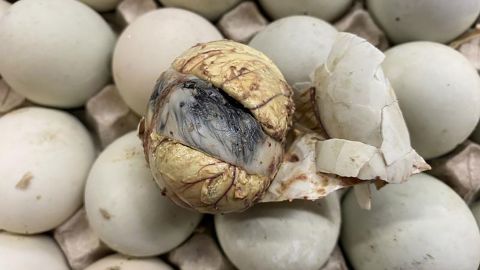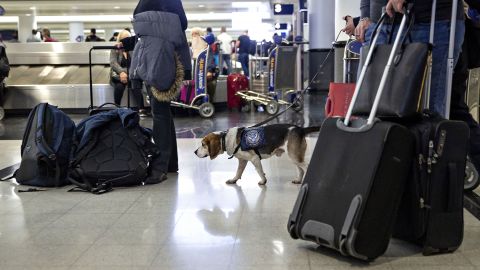CNN
—
United States border officials have a concept for tourists who bring food merchandise from overseas: Violations will price you.
Past thirty day period, a passenger traveling from Indonesia to Darwin Airport in Australia’s Northern Territory was fined $1,874 just after two egg and beef sausage McMuffins – together with a ham croissant – had been discovered in their luggage. (Australian authorities experienced imposed tricky new biosecurity actions on all arrivals soon after a foot and mouth disorder outbreak in Indonesian livestock.)
In a individual incident a few times before, an Australian girl was fined $1,844 immediately after she forgot to declare a leftover Subway sandwich she acquired in Singapore.
In the earlier 12 months by yourself, US border officials have fined travellers for bringing a large range of undeclared food items in their baggage, including balut eggs, pork bologna and turkey ham. Border officials performed “630,150 constructive passenger inspections” in 2021, according to figures for the fiscal year released by US Customs and Border Defense, and issued countless numbers of penalties and violations to travelers who unsuccessful to declare prohibited agriculture objects.

Failure to declare food products and solutions at US air, sea and land border entry points can direct to fines and penalties of up to $10,000, in accordance to the CBP.
Here’s what you have to have to know ahead of bringing foodstuff merchandise into the US.
Tourists bringing foods solutions into the US can inadvertently introduce international pests and food-borne illnesses into the nation, which can have a devastating effect on agriculture and the ecosystem. And a pest or ailment outbreak could effects a lot more than just farmers. It also indicates greater grocery costs and scarcity of some food items objects for individuals.
Last calendar year, border officials learned 264 pests at US ports of entry, a slightly larger variety than the 250 located the prior yr. Pests intercepted previous year contain a Saunders 1850 butterfly larvae located in pineapples from Costa Rica. The larvae feeds on crops and legumes, and is considered an invasive pest primarily uncovered in Amazonian tropical rainforest. Introducing it in the US ecosystem could be harmful to the agriculture field, the CBP claimed.
“We work carefully with the US Department of Agriculture, Animal and Wellness Inspection Services to prevent the introduction of plant pests and overseas animal ailments,” a CBP spokesperson informed CNN.
Most meat, poultry, milk and egg items are possibly banned or limited in the US – with guidelines relying on the region of origin and what livestock illnesses are prevalent in the area.
The United States Section of Agriculture prohibits animal and chook merchandise from countries with documented conditions of livestock disorders these as mad cow, foot-and-mouth, avian flu and swine fever. The USDA supplies a connection where travelers can check out common animal ailments in distinct international locations.
From time to time, there are gray areas. Pork goods from Mexico are banned, for example, but a little amount of money for particular use – like a ham sandwich – could be allowed at land borders if the meat is completely cooked.
A prolonged checklist of foodstuff products are authorized into the US, like condiments, cooking oils, bread, cookies, crackers, cakes, cereal, packed tea and other baked and processed goods. The CBP offers a record of allowed objects on its website.

But there’s a catch: If a traveler provides over 50 pounds of an merchandise, it’s thought of a commercial shipment and have to bear added measures, which include more security inspections. And each individual agricultural meals product has to be declared on US Customs types, so inspectors can study them and make certain they do not carry dangerous foreign pests or ailments.
“The declaration should protect all items carried in checked baggage, have-on luggage or in a automobile,” the CBP’s web-site notes.
The brief response is no.
Virtually all contemporary and frozen fruits and veggies are prohibited from getting into the US owing to risks of pests and illnesses – some of which can endure in frigid temperatures, in accordance to the US Department of Agriculture. Even the fruits and vegetable snacks delivered on an plane or cruise ship need to be remaining driving, says Lucero Hernandez of the federal Animal and Plant Health and fitness Inspection Services.
Vacationers crossing a land border into the United States from Canada can provide some contemporary fruits and greens – as lengthy as they were grown in Canada. But they will need evidence that the develop is free of charge of soil, pests, and ailments, and that it was grown in Canada, not just bought there, the USDA suggests.
And in all cases, tourists coming to the US must help you save receipts and original packaging to confirm meals products’ nation of origin, according to the CBP.
Vacationers who declare agricultural goods in their baggage really do not facial area penalties – even if an inspector concludes the things are not suitable to enter the place, the USDA claims. In such cases, the foods is ruined.
“An apple or snack that can mistakenly be introduced won’t generally make a considerable incident,” the CBP spokesperson discussed of an unintended failure to declare a food merchandise. “However, trying to convey in prohibited merchandise would lead to traveler delays and may well outcome in a good.”
“Failure to declare a prohibited food item might end result in the issuance of a civil penalty,” the spokesperson added.




More Stories
Top 5 Cafe around Sudirman Worth a Visit
KC named one of the best places in America to travel
At Urban Hawker in New York, Singapore street food gets a new HQ